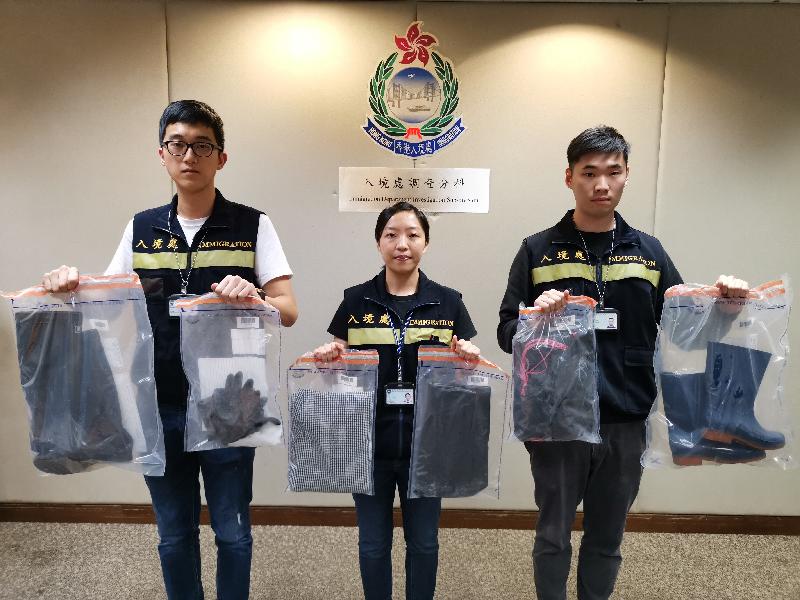Following months of intelligence analysis and in-depth investigation, the Immigration Department (ImmD), working with the Guangdong Provincial Public Security Department and the Division of Exit-entry Administration of the Shenzhen Municipal Public Security Bureau (SZPSB), smashed a human smuggling syndicate in a joint operation conducted in Guangdong Province and Hong Kong on March 27.
Through continuous intelligence collection and exchange, the above-mentioned authorities detected an active cross-boundary human smuggling syndicate that specialised in arranging for Vietnamese nationals to seek illegal entry into Hong Kong via the land border.
When the syndicate was planning to smuggle illegal immigrants from Shenzhen into Hong Kong by boat on March 27, SZPSB officers took immediate action and arrested five core syndicate members, all of them Mainland residents, and two Vietnamese illegal immigrants who were about to sneak into Hong Kong. Meanwhile, acting on intelligence, ImmD officers raided 15 target locations in the territory including restaurants, food factories, residential buildings, a barbecue site and nail polish shop. A total of 17 illegal workers and seven employers were arrested. The illegal workers comprised 12 men and five women, aged 22 to 58. Among them, one man and three women were holders of recognisance forms, which prohibit them from taking any employment. Also, three of the arrestees were suspected of using and being in possession of forged Hong Kong identity cards. Three men and four women, aged 34 to 58, were suspected of employing the illegal workers.
“Any person who contravenes a condition of stay in force in respect of him shall be guilty of an offence. Also, visitors are not allowed to take employment in Hong Kong, whether paid or unpaid, without the permission of the Director of Immigration. Offenders are liable to prosecution and upon conviction face a maximum fine of $50,000 and up to two years’ imprisonment. Aiders and abettors are also liable to prosecution and penalties,” an ImmD spokesman said.
The spokesman warned that, as stipulated in section 38AA of the Immigration Ordinance, illegal immigrants or people who are the subject of a removal order or a deportation order are prohibited from taking any employment, whether paid or unpaid, or establishing or joining in any business. Offenders are liable upon conviction to a maximum fine of $50,000 and up to three years’ imprisonment. The Court of Appeal has issued a guideline ruling that a sentence of 15 months’ imprisonment should be applied in such cases. A person using or possessing a forged Hong Kong identity card also commits an offence. Offenders are liable to prosecution and upon conviction to a maximum fine of $100,000 and imprisonment for 10 years.
The spokesman reiterated that it is a serious offence to employ people who are not lawfully employable. The maximum penalty is imprisonment for three years and a fine of $350,000. The High Court has laid down sentencing guidelines that the employer of an illegal worker should be given an immediate custodial sentence. According to the court sentencing, employers must take all practicable steps to determine whether a person is lawfully employable prior to employment. Apart from inspecting a prospective employee’s identity card, the employer has the explicit duty to make enquiries regarding the person and ensure that the answers would not cast any reasonable doubt concerning the lawful employability of the person. The court will not accept failure to do so as a defence in proceedings. It is also an offence if an employer fails to inspect the job seeker’s valid travel document if the job seeker does not have a Hong Kong permanent identity card. The maximum penalty for failing to inspect such a document is imprisonment for one year and a fine of $150,000.
Under the laws of Hong Kong, it is an offence for any person to seek illegal entry into Hong Kong and remain without the authority of the Director of Immigration. Offenders are liable to prosecution and upon conviction to a maximum fine of $25,000 and imprisonment for three years. Those aiding and abetting in such crimes are liable to the same penalty. Moreover, it is an offence to arrange and assist the passage to Hong Kong of a person who is an unauthorised entrant. Offenders are liable to prosecution and upon conviction to a maximum fine of $5 million and imprisonment for 14 years.
Under the existing mechanism, the ImmD will, as a standard procedure, conduct initial screening of vulnerable persons, including illegal workers, illegal immigrants, sex workers and foreign domestic helpers, who are arrested during any operation with a view to ascertaining whether they are trafficking in persons (TIP) victims. When any TIP indicator is revealed in the initial screening, the officers will conduct a full debriefing and identification by using a standardised checklist to ascertain the presence of TIP elements, such as threat and coercion in the recruitment phase and the nature of exploitation. Identified TIP victims will be provided with various forms of support and assistance, including urgent interference, medical services, counselling, shelter, temporary accommodation and other supporting services. The ImmD calls on TIP victims to report crimes to the relevant departments.



